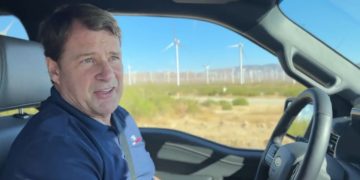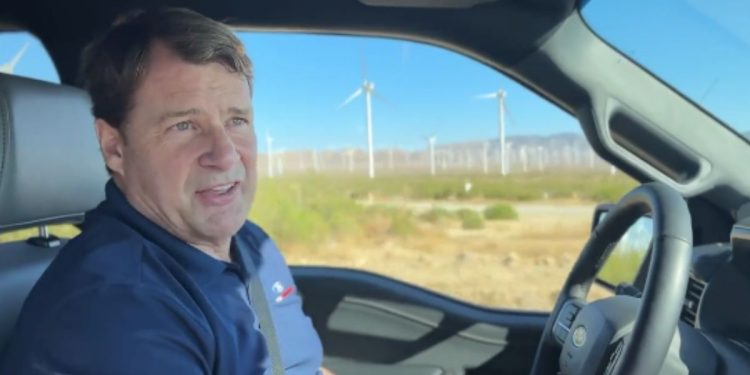Right now, I am driving a Ford Bronco Sport. It is eco-friendly but also gas-powered.
Taking incremental steps like this is exactly what we should be doing if we really want to care for our planet. Allowing solutions to unfold naturally is always better than forcing them before their time.
When you force things, you invite trouble. That is what the CEO of Ford found out when he recently took to the road in an F-150 Lightning electric pickup truck.
According to Fox News, Jim Farley wanted to understand exactly what his customers are experiencing when driving long distances in their EVs. His road trip from Palo Alto, California, to Las Vegas told him everything he needed to know.
“Charging has been pretty challenging,” he said in a video posted to X, formerly Twitter, on Sunday. “It was a really good reality check — the challenges of what our customers go through.”
No surprise charging can be a challenge, but still learning a lot seeing firsthand the issues our customers face. This is why we’re working w/ @Tesla to provide @Ford drivers access to +12,000 superchargers & our EV certified dealers are installing fast chargers at their… pic.twitter.com/fES15o9orT
— Jim Farley (@jimfarley98) August 13, 2023
During a stop at a low-speed charging depot along the way, Farley said it took 40 minutes to charge his battery 40 percent.
This is a huge part of the reason why consumers have been slow to adopt EVs. The speed and accessibility of charging stations (or lack thereof) weigh heavily on people’s minds when choosing between a gas-powered car and an EV.
Farley had a much better experience when he pulled into a charging station in Baker, California, where he found a high-speed charger. “Was so quick and easy. Really highlighted the difference that nice stations and fast charging can make on the overall EV experience,” Farley tweeted.
No doubt, it was this realization that prompted the new partnership between Ford and Tesla. Starting this spring, Tesla will make its Supercharger network available to Ford EVs, Fox reported.
But will the expanded infrastructure be enough to convince Ford buyers to make the leap from gas to electric? That remains to be seen.
Let’s face it — Ford customers aren’t Tesla customers. Ford people value reliability. They work their vehicles hard.
Many also understand how cars and trucks work firsthand. They are the people who keep this nation running. They haul, work with their hands, drive long distances. Heck, many are mechanics themselves.
Ask any mechanic what his thoughts are about EVs. He will give you an earful.
Only a portion of his rant will be about the lack of charging infrastructure. The rest will outline how nonsensical these vehicles currently are, given their reliance on gas-powered charging stations, not to mention the strain they place on an already underperforming grid.
A gas powered generator to charge an EV. pic.twitter.com/XSzAwEIDFY
— Laura J Wellington (@TheFourStarDiet) August 18, 2023
Factor in the major improvements made over the last two decades in the efficiency and cleanliness of the internal combustion engine, as well as the readily available slew of gas stations, and you’ll have yourself one heck of a conversation between.
That isn’t where it will end, though, I assure you.
He will then lay out all of the problems associated with manufacturing EVs, including harsh mining practices and potential mineral shortages. Oh, and it also lines the pockets of China in a big way.
“China owns basically 70-80% of the entire supply chain for electric vehicles and lithium-ion batteries,” Stuart Crow of Lake Resources told the Financial Times last year. I can’t imagine Ford truck owners appreciating that.
Then there’s the enormous cost of battery replacements, coming in at somewhere between $2,000 and $20,000. Yes, EV batteries are meant to last the lifetime of the vehicle. In unforeseen circumstances, however, buyers can’t risk having to foot the bill for a replacement, especially when some can hardly afford a gallon of milk.
Many view the top-down push to transition from gas to electric vehicles as nothing more than another scam thought up by the government in cahoots with corporate America to grab more power away from the people. Plenty don’t think EVs will have any impact on the climate — if they even buy the climate change theory at all.
The current limitations that come with owning an electric vehicle preclude them from being widely adopted. They just aren’t practical for anyone who drives long distances.
More disturbingly, the demand that Americans make such sacrifices in the name of solving the “climate crisis” foreshadows our freedoms being removed one by one until we are living in a box and told to love it.
This article appeared originally on The Western Journal.

























